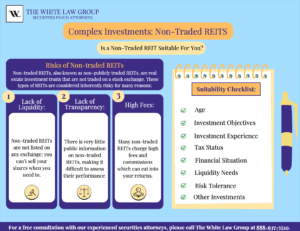W.P. Carey Plans Spin-Off, Selling Off Real Estate Assets
The White Law Group continues to investigate potential securities claims involving W.P. Carey, Inc. Our firm has represented numerous investors over the years in claims against their brokerage firms for unsuitable investments in W.P. Carey REIT Offerings.
According to reports, W.P. Carey (NYSE:WPC) shares took a hit on September 21st after management announced that the company will be ditching its entire office portfolio. Some of the assets will reportedly be spun off, while the rest will be sold.
As we have previously reported, in February 2022, WP Carey Inc. exited investment management, after acquiring Corporate Property Associates 18 Global Inc in a $2.7 billion cash-and-stock deal.
W. P. Carey listed its common stock on the NYSE in 2012 and closed mergers with affiliated Corporate Property Associates REITs — CPA 15 (October 2021), CPA 16 (January 2014), and CPA 17 (October 2018), according to reports.
According to the press release issued by W. P. Carey last week, the company’s “strategic plan” will allow it to exit the office real estate space. A portion of the assets will be spun off into a separate publicly traded company, with management expecting that deal to close November 1, 2023. And the rest of the assets will reportedly be sold off, with a target date for completion of January 2024.
Watermark Lodging Trust – WP Carey REIT Investment Losses
Carey Watermark Investors 1 and Carey Watermark Investors 2, two publicly registered non-traded REITs sponsored by W.P. Carey Inc. (NYSE: WPC), merged in October 2019, to create a hotel REIT, Watermark Lodging Trust. Unfortunately for investors, after the merger, the REIT declared its first post-merger net asset value (NAV) of $5.51 per Class A share and $5.45 per Class T share. Original shares were sold for $10 each indicating nearly a 50% loss. See: Bad News for Watermark Lodging Trust Shareholders
The Risks of Investing in W.P. Carey Non-traded REITs
 If you invest in non-traded Real Estate Investment Trusts (REITs), such as W.P. Carey, it’s essential to be aware of the potential risks, especially when certain economic and market factors are in play.
If you invest in non-traded Real Estate Investment Trusts (REITs), such as W.P. Carey, it’s essential to be aware of the potential risks, especially when certain economic and market factors are in play.
Office REITs in particular have taken a hit due to the changing landscape of remote work. With more people working from home, the demand for office space has shifted. Companies are adopting flexible work arrangements, which might mean they need less office space or could opt to downsize their current office footprint. Reduced demand for office space can lead to higher vacancy rates in office properties, potentially impacting the rental income generated by office REITs. If these REITs have a significant investment in office properties, they could experience declining rental income and property values.
Consider the impact of high-interest rates. As an investor, you should know that non-traded REITs often rely on borrowing to finance property acquisitions and improvements. When interest rates rise, borrowing costs increase, potentially squeezing the REIT’s profitability and its ability to distribute dividends to investors. This situation might make the investment less appealing, especially in a rising interest rate environment.
Furthermore, non-traded REITs often focus on specific geographic regions or property types, such as suburban office buildings or certain markets. This limited diversification can make these REITs more vulnerable to local economic conditions and trends. If a particular market or property type experiences a downturn, the overall performance of the REIT might suffer.
Keep in mind the issue of liquidity. Non-traded REITs typically have less liquidity compared to publicly traded REITs. If you invest in non-traded REITs, you might find it challenging to sell your shares quickly, and you could face restrictions on when and how you can exit your investment. In uncertain market conditions or when the investment outlook is less favorable, this lack of liquidity can become a risk, as you may not be able to access your capital easily.
Lastly, consider the issue of valuation uncertainty. Non-traded REITs are known for their opaque valuation practices. Unlike publicly traded REITs with readily available market prices, non-traded REITs typically provide periodic valuations that may not accurately reflect current market conditions. As an investor, it can be challenging to assess the true value of your investment, particularly during turbulent times.
Due Diligence on Investment Recommendations
The White Law Group is investigating the liability that brokerage firms may have for improperly selling W.P. Carey REITs to investors.
Broker dealers are required to perform adequate due diligence on all investment recommendations. They must ensure that each investment recommendation that is made is suitable for the investor considering the investor’s age, risk tolerance, net worth, financial needs, and investment experience.
Fortunately, FINRA provides an arbitration forum for investors to resolve such disputes. If a broker or brokerage firm makes an unsuitable investment recommendation or fails to adequately disclose the risks associated with an investment, they may be found liable for investment losses in a FINRA arbitration claim.
Recovery Options for Investors
To determine whether you may be able to recover investment losses incurred as a result of your purchase of W. P. Carey or another W.P. Carey offering , please contact The White Law Group at 1-888-637-5510 for a free consultation.
The White Law Group, LLC is a national securities fraud, securities arbitration, investor protection, and securities regulation/compliance law firm with offices in Chicago, Illinois and Seattle, Washington. The firm represents investors throughout the country in claims against their brokerage firm.
For more information on the firm and its representation of investors, visit www.WhiteSecuritiesLaw.com.
Tags: Corporate Property Associates 18 Global, CPA 18, NYS WPC, office REITs, W.P. Carey, Watermark Lodging Trust Last modified: September 25, 2023





